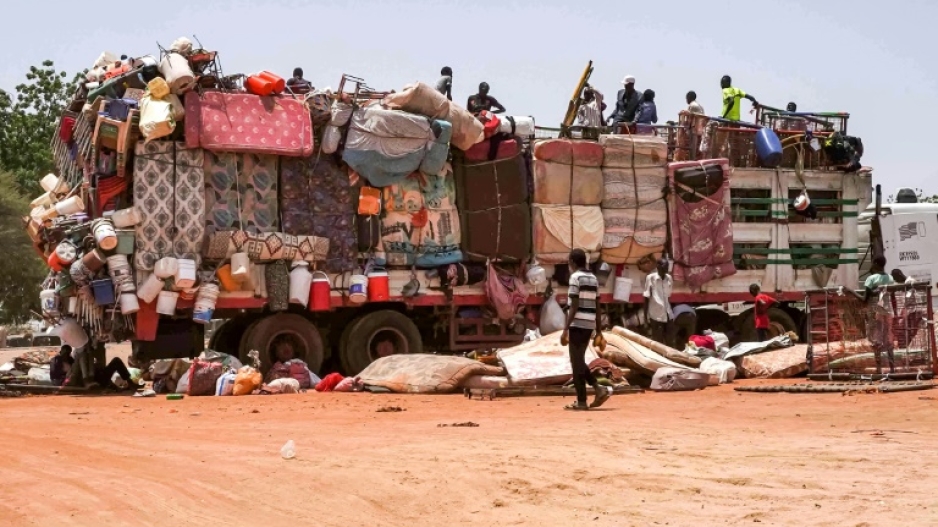
WAD MADANI, Sudan, July 19, 2023 (BSS/AFP) - Mahana Abdelrahman used to criss-cross Sudan in his truck, delivering shipments across the vast country, but three months of brutal war have drastically reduced road transportation, grinding business to a halt.
Now, the 45-year-old driver chain-smokes and sips coffee at a cafe on the outskirts of Wad Madani, a city that has welcomed him and many others who fled the war-weary capital Khartoum, some 160 kilometres (100 miles) to the north.
In 20 years of working as a lorry driver, usually carrying goods from Red Sea ports, Abdelrahman has "never seen anything like this war", he told AFP.
The fighting, which erupted on April 15 when a power struggle between rival generals spilled into all-out war, has killed thousands and displaced millions.
"I used to drive across the country four times a month, now I've been here for three weeks and there's nothing to carry anywhere," Abdelrahman lamented.
Around him, lines of parked lorries in their hundreds stretched as far as the eye can see, while drivers were playing cards and drinking tea in the small road-side cafes of Al-Jazirah state.
Hundreds of thousands of displaced Khartoum residents have found safety in Al-Jazirah, but -- like in other parts of the country -- still face dire shortages of food, medicine and other supplies.
With air strikes, artillery blasts and countless checkpoints around Khartoum, road traffic across the country has dropped by 90 percent since fighting began, according to a report by Sudan's national chamber of transport seen by AFP.
This has had a serious effect on commercial activity.
According to figures from Sudan's ports authority, total exports since January amounted to $282 million. That figure stood at $2.5 billion for the first half of 2021.
- 'Impossible' journey -
Driver Mohamed al-Tijani said that even when there is cargo to shuttle, the journey has become far longer than it used to be.
With fuel costs soaring, up to 20 times pre-war prices, travel has also become more expensive.
To avoid the violence and the checkpoints set up by both army and the paramilitary Rapid Support Forces, drivers try to bypass Khartoum entirely, "making our journey to the ports at least 400 kilometres longer", 50-year-old Tijani told AFP.
Million remain trapped in the inaccessible capital, often without the means to support themselves as factories were shelled, warehouses looted and markets ransacked.
In the early days of the fighting, passenger buses would travel in convoys, carrying terrified Sudanese fleeing the fledgling violence. Now, they have stopped moving in and out of Khartoum.
Before the war, "around 70 percent of bus travel used to be between Khartoum and the other states" in the country, driver Hussein Abdelqader told AFP.
He said his business, which relied on Sudan's heavily centralised road network, has plummeted.
Another driver, Moataz Omar, used to transport families from Khartoum to Sudan's border with Egypt -- a 1,000-kilometre journey -- in the first weeks of the war.
"But as the fighting got worse, it became impossible to enter Khartoum," he told AFP.
- The long way round -
The already gruelling trip between the Egyptian border and Al-Jazirah's makeshift transport hub has more than doubled, Omar said.
Drivers "now have to head east to Red Sea state, and then through Kassala to Gedaref," on the southeastern border with Ethiopia, before heading back up north, in a 2,600-kilometre loop nearly impossible to find passengers for.
"I've stopped making the trips north," he said.
As the war shows no signs of abating, the drivers -- like much of Sudan's population -- fear for their livelihood.
"We're afraid we're going to lose our jobs," said Tijani. "The companies aren't going to pay our salaries if they're not making money."
Some buses still make the costly and meandering trips around the Sudan. The country's trains, however, all sit collecting dust.
Passenger and freight cars, which used to travel between the capital and Atbara in the north as well as Wad Madani in the south, stopped in their tracks with the first blasts in Khartoum.
They have not moved since.
A railway official said trains carrying cargo from sea ports have also stopped.
The tracks which traverse Khartoum North "have become a battlefield themselves," he told AFP, requesting anonymity as he was not authorised to speak to the media.
It was not just the railway that has been affected.
Khartoum North has become a shell of its former self -- a ghost town with no water or electricity, most of its residents escaped south to Wad Madani, or north to Egypt.